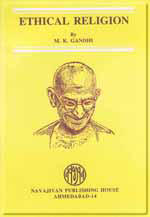
P.O. SEVAGRAM, DIST.WARDHA 442102, MS, INDIA. Phone: 91-7152-284753
FOUNDED BY MAHATMA GANDHI IN 1936
ETHICAL RELIGION

ETHICAL RELIGION
Table of Contents
- Introduction
- Beginning
- Ideal Morality
- What is Moral action?
- Is There A Higher Law?
- Morality As A Religion
- Religious Morality or Moral Religion
- Social Ideal
- Personal Morality
- Seven Deadly Sins of Intolerance
About This Book
Written by : M. K. Gandhi
First Edition :3,000 copies, December 1968
ISBN : 81-7229-348-8
Printed and Published by : Jitendra T. Desai
Navajivan Mudranalaya,
Ahemadabad-380014
India
© Navajivan Trust, 1968
Download
Chapter 2: Ideal Morality
The current views of morality are not of a very high order. Some believe that morality is not something quite essential. Other thinks that there is no relation between religion and morality. But an examination of the world's religions shows that, without morality, religion cannot subsist. True morality covers religion for the most part. Anyone who observes the laws of morality for their own sake and not for any selfish end can be regarded as religious. There are men in Russia who dedicate their lives to the good of their country. Such men are truly moral. A man like Jeremy Bentham, who discovered many good principles for English legislation, tried very hard to spread education among the English and took a prominent part in improving the condition of prisoner, may be regarded as truly moral.
Besides, it is a rule of ideal morality that it is not enough to follow the trodden path. We ought to follow the path which we know to be true, whether it is familiar or unfamiliar to us. In other words, when we know a particular path to be the right one, we should set out on it without fear. We can progress only if we observe the laws of morality in this way. That is why true morality true civilization and true progress are always to be found together.
If we examine our desires, we shall see that we do not wish for what we have already. We always value more that which we do not have. But desires are of two kinds; one is the pursuit of mere self-interest. To attempt to fulfill this kind of desire is immoral. The other impels us constantly to improve ourselves and to do good to others. We should never become overweening with any amount of good that we may do. It is not for us to evaluate it, but rather should we have perpetual longing to become better and do more good. True morality consists in our effort to realize such longing.
If we have no home or no family of our own, that is nothing to be ashamed of. But if we have a home and abuse it, or own a business and practice fraud, we stray from the path of morality. Morality consist in doing what we ought to do. We can prove the need of morality through a few illustrations. Destruction has been the lot of peoples or families in which the seeds of immorality, such as disunity and untruth, were found. To take an example from trade and business, we do not come across a single person who will say that truth should not be followed. The effect of justice and goodness is not felt from outside; these qualities in here in us. Four hundred years ago, much injustice and untruth prevailed in Europe, so that people could not rest in peace even for a moment. The cause of this state of affairs was that people has no morality. If we take out the essence of all moral laws, we shall find that the attempt to do good to mankind is the highest morality. If we open the treasure-house of morality with this key, we shall find in it all the other principles.
At the end of these articles, we print select poems bearing on morality from Gujarati or Urdu poets in the hope that all our readers will benefit from them and will also commit them to memory.